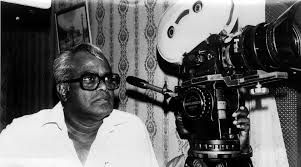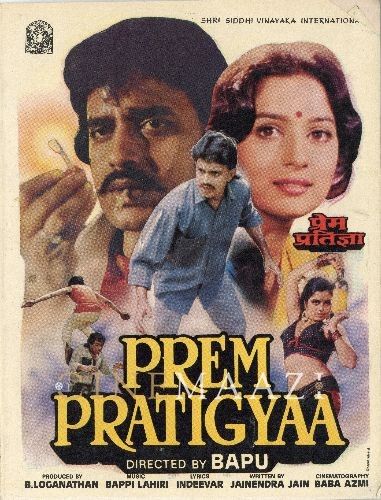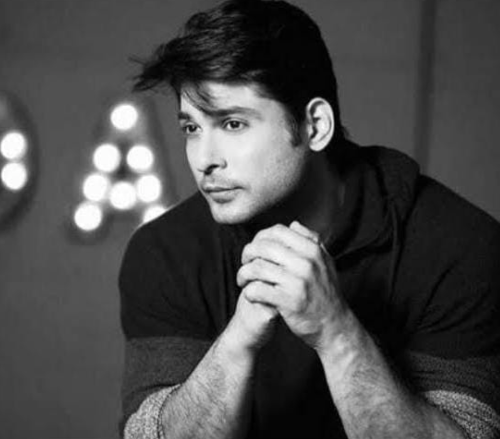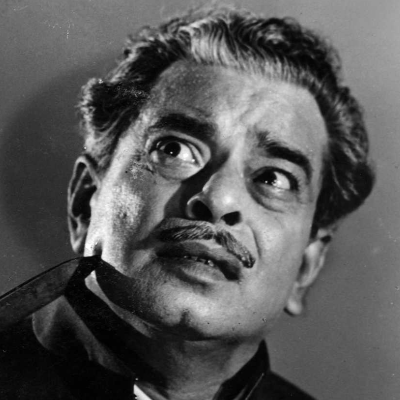Dattaram Wadekar
- Born: 1929 (Goa)
- Died: 8 June, 2007 (Goa)
- Primary Cinema: Hindi
Impeccable music arranger and music director Dattaram Wadkar was known for assisting music directors Shankar-Jaikishan for more than four decades. Raj Kapoor was impressed by Dattaram's tabla performances, and the latter went on to play the tabla in songs such as Mud mud ke na dekh and Ramayyaa vastaavayyaa (Shri 420, 1955) and Aaja sanam madhur chandni mein hum and Jahan main jati hoon wahi chale aate ho from Chori Chori (1956). In fact, as he was a master of thekka (beat), it became known as Dattu's thekka. Dattaram also played the duff in the songs Dil ka haal sune dilwala and Mera naam Raju. As arranger for Shankar-Jakishan, along with his other Goan colleague Sebastian, he used to arrange for percussion-based songs. Raj Kapoor also enabled Dattaram’s transition as an independent music director entrusting the music of Ab Dilli Door Nahi (1957) to him. Other films that Dattaram composed for include Qaidi No. 911 (1959), Shrimaan Satyavadi (1960), Kala Aadmi (1960), Zindagi Aur Khwaab (1961), and Jab Se Tumhe Dekha Hai (1963).
Dattaram Wadkar was born in Goa in 1929. Moving to Bombay along with his mother in 1942, in his early days, he worked as a loader at the Bombay docks. He learned to play the tabla from Pandhari Nageshwar, and later trained under Yashwant Kerkar. Starting off his music career, he worked with composer Sajjad Hussain for three months, on the recommendation of Yashwant Kerkar. Incidentally, Dattaram was an avid fitness and bodybuilding enthusiast. He was a regular at the same gym frequented by Shankar of Shankar-Jaikishan fame. Once, Shankar spotted a tabla set, and began playing. Hearing him, Dattaram was fascinated and made him his guru. At the time, Shankar and Jaikishan worked with Prithvi Theatres, playing the tabla and harmonium respectively. Dattaram was invited by Shankar to Prithvi Theatre, and later he went on to play the sitar and shehnai during intervals of the plays. Thus, when Shankar-Jaikishan turned independent composers with Raj Kapoor’s Barsaat (1949), Dattaram also became part of the group.
Dattaram’s tabla performances particularly impressed Raj Kapoor, and he started playing both the tabla and dholak in Shankar Jaikishan's orchestra besides assisting them. He was credited as assistant with them from Nagina (1951) onwards. His delivered prominent tabla performances in the songs of Shree 420 (1955), namely in Mud mud ke na dekh and Ramayyaa vastaavayyaa as well as in Chori Chori (1956) in the songs Aaja sanam madhur chandni mein hum and Jahan main jati hoon wahi chale aate ho. A master of the thekka (beat), it became known as Dattu's thekka thereafter. Dattaram was also known for his playing of the duff in songs such as Dil ka haal sune dilwala and Mera naam raju gharana from Shri 420, as well as Jis desh mein ganga bahti hai.
Wadkar went on to become the arranger for percussion-based songs for Shankar Jaikishan, along with his other Goan colleague Sebastian, who would arrange tunes based on western instruments. He got his break as an independent composer when, after the mega success of Barsaat, Awara (1951) and Shree 420, Raj Kapoor made Ab Dilli Door Nahi (1957), entrusting Dattaram with its music. Though the film did not succeed at the box office, the music met with approval, in particular the songs Ye chaman hamara apna hai rendered by Asha Bhosle, Jiyo laal mere lakhon baras by Lata Mangeshkar, Mata o mata jo tu aaj hoti by Sudha Malhotra, and the popular Rafi song Chhun chhun karti aaiye chidya. Dattaram went on to compose the unique Lata-rendered song Meethi meethi baaton se bachna zara in Qaidi No. 911 (1959), a romantic duet Pyaar bhari ye ghatain by Manna Dey and Lata, the romantic duet Bole ye dil ka ishara in Santaan (1959), Dil ne use maan liya jiska andaaz naya rendered by Mukesh, and the children’s song Chhoti si dulhaniya ki shaadi by Lata.
He did another film with Raj Kapoor - Shrimaan Satyavadi (1960), which featured well-rendered songs by Mukesh including Rut albeli mast shama and Haal-e-dil hamara. He also scored another romantic duet - Bhhingi hawaon mein teri adaon mein sung by Manna Dey and Suman Kalyanpur. Dattaram scored a much-appreciated song in Kala Aadmi (1960) rendered by Mukesh - Dil dhundhta hai sahare sahare. His music for First Love (1961) included compositions such as Mere pyaar mein ya wafa na thi, Mujhe mil gai mohabbat ki manjil, Bite hue din kuch aise hi hai, and Mano ya na mano. For the Meena Kumari-Rajendra Kumar starrer Zindagi Aur Khwaab (1961) he scored the popular numbers Kabhi kisi ki khushiyaan koi loote na rendered by Mukesh, Phool bagiyan mein bhanvre aaye sung by Mubarak Begum, the duet Na jane kahan tum the na jane khan hum thein by Suman Kalyanpur and Manna Dey, and the fast-paced Kehti hai jhuki jhuki nazar by Suman Kalyanpur.
He delivered a tremendous musical hit with Jab Se Tumhe Dekha Hai (1963), composing the Rafi number Hum aapki mehfil mein bhule se chale aaye and the classical-based composition Mohammad shah rangele gavat aaj prem raag sur bade nasheele rendered by Manna Dey. He composed the popular qawwali Tumhe husn de ke khuda ne sitamgar banaya rendered by Rafi, Lata, Asha and chorus, with the second part in the voice of Manna Dey and chorus.
An exceptional percussionist, Dattaram played the dholak in Sari sari raat teri yaad sataye rendered by Lata in Aji Bas Sukriya (1958), and the tabla in Madhumati(1958) for Aaja re pardesi, Ghadi ghadi mera dil dhadke and Suhana safar aur ye mausam hansee. With the changing times, music composers like Laxmikant-Pyarelal and Kalyanji-Anandji became increasingly popular, while Dattaram had to accept B-grade films such as Tarzan Comes to Delhi (1965), Raaka (1965) and Choron Ka Chore (1970). He nevertheless impressed in Neeli Aankhein (1962) with Ae meri jaan-e-wafa maine dekha hai ye pyaar sung by Mukesh and chorus, and Dekhiye na is tarah jhoom ke rendered by Geeta Dutt.
Dattaram grew disappointed with the music of the 80s and 90s. What’s more, after the demise of Jaikishan in 1973, the same magic could be not created. After scoring music for approximately 20 films as an independent film composer, Dattaram returned to his native place, Goa. Dattaram Wadkar passed away on 8 October, 2007, at the age of 78.
References
Additional information courtesy: http://www.millenniumpost.in/sundaypost/beacon/the-nobel-series-with-scientific-prowess-442401?infinitescroll=1










.jpg)


